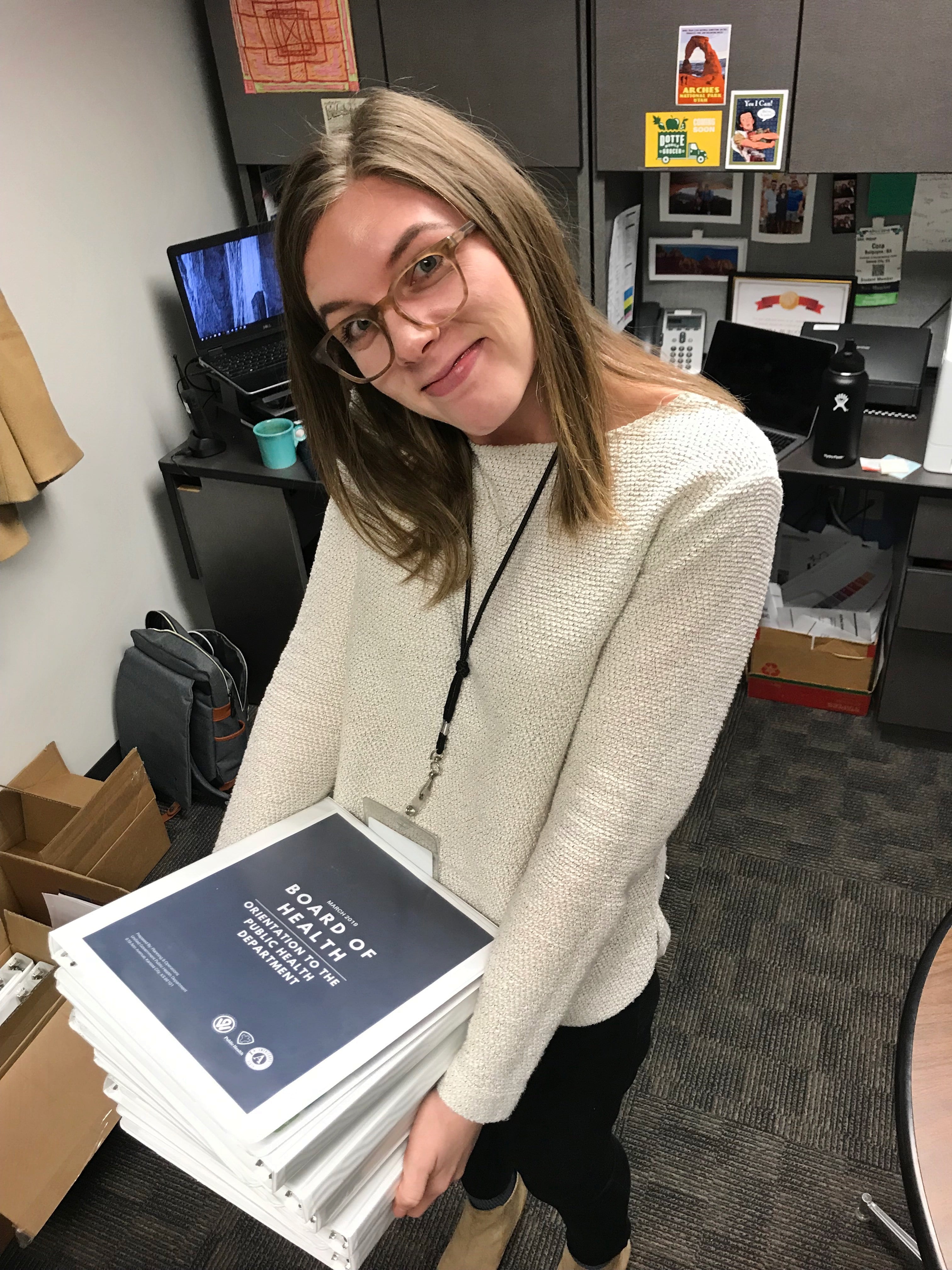Note from Lizzie Corcoran: I met Cora at APHA annual 2018, when her professor and mentor from her MPH program, Tanya Honderick, brought her to meet some de Beaumont staff and talk about the public health governmental workforce pipeline. I was so pleased and impressed at this example of mentorship in an MPH program between Cora and Tanya! After chatting about workforce shortages and inefficiencies, combined with the public health training, we quickly realized that Cora was the perfect example of what the public health stands to gain or lose. Cora is deeply trained, passionate, creative, and ready to take on new challenges. We asked her to write about her experience in a public health department going through accreditation.
 What it’s like to be a millennial working in governmental public health? Let me tell you.
What it’s like to be a millennial working in governmental public health? Let me tell you.
Before I entered the field of public health, I was in a health psychology undergraduate program. I was pretty set on becoming a clinical health psychologist and working with people one on one. However, toward the end of my undergraduate program, I started working more in group-based health. I started to understand how the larger systems at play were inhibiting people from living their most optimal lives.
Enter public health.
Fast forward to the first semester of my Master of Public Health program, when I was granted an opportunity to serve at the Unified Government Public Health Department (UGPHD) as an AmeriCorps*VISTA member. My project involved supporting the administrative side of the county’s first Community Health Assessment and Community Health Improvement Plan. However, after a few short months, my work quickly evolved to working on many projects that supported the UGPHD’s accreditation initiatives through the Public Health Accreditation Board, which oversees accreditation for all public health departments nationwide. This opened my eyes to the work of local governmental public health, a field that I never knew existed.
Governmental public health is a part of the public health system that did not get talked about enough in my education. In fact, in my 500-page textbook, it was just a section in one chapter. Looking back, I wonder, why aren’t we being taught about one of the largest public health systems in the country?
At UGPHD, as I became embedded in the work, I began to notice a sharp contrast in the way that I was approaching projects compared with some of my colleagues. It seemed as if folks had lost their sense of urgency, lost their fire. And here I was, all bright-eyed and bushy-tailed, ready to create large infrastructure changes to the entire way the health department operates, working with people who had been in the same job for 20 or 30 years. It took me a while to not feel frustrated about the slow rate of change when I walked out of meetings. Maybe it’s because some of my colleagues had been in the system for too long. Maybe it was because some were just waiting out retirement. Or maybe it’s because they had become so entrenched in the way things have been, this was the only way they knew how to operate.
While I am familiar with being the youngest person in the room, I was unfamiliar with being the youngest person in the room and making decisions and being the driver of change. There were weeks when I was learning about public health administration in the classroom, then turning around and using those concepts and theories at my job. Which is really amazing, a great way to get real-world experience during schooling. But at the same time, I was learning about best practices, then going to work and realizing, oh dang, this is the way it really is.
Never fear, I am not shying away from governmental public health. In fact, I am diving deeper. The communities that we serve deserve everyone’s best effort. I will not stand for stagnation in the workforce when there are so many bright individuals (including many millennials) who are so ready to engage and learn and make their little area of the world better. That’s why I support and enjoy working on accreditation initiatives, because it is practical, actionable wake-up call for how behind we have allowed our health departments to fall.
There are certain things that we can do to move public health departments into public health 3.0. In my opinion, the most important is supporting health department accreditation. While some health departments might not have capacity to pursue the entire accreditation process, the standards and measures set by the Public Health Accreditation Board truly reflect the role that public health needs to move to. Standards like how we communicate, how we interact with our governing bodies, choosing evidence-based practices over convenience, and how we view social determinants of health.
I finished my service year as an AmeriCorps VISTA member in February and was immediately hired to be an intern to continue my work until the end of the summer. This transition from AmeriCorps VISTA to paid intern has never happened at the health department. Being offered this position made me feel valued and supported, and it validated my desire to continue working in this field.
I won’t lie. It was, and still is, incredibly frustrating to be so passionate about creating these infrastructure changes while working with people who don’t share that same drive. But let me tell you, when you find a few people, classmates, colleagues, and mentors who share your same vision, anything is possible! One of the greatest things that has come out of my year working in the health department are the allies who have stepped up to the plate. Some of these people haven’t had any formal public health training but understand the importance of the work and cross-sector collaboration. When I check in with these folks, because 9/10, they will have thought of a solution that I never would have. You can’t change the system alone.
So what am I doing next?
I’ll be focusing on all my energy on finishing my MPH degree and graduating in the spring. Then I’ll hopefully continue working in governmental public health, because I love the work and everything that comes along with it. So as a millennial entering the workforce along with many other young public health professionals I say this: please don’t try to fix the world by yourself. Find your allies, invite others to the table, make a plan…then get to work.





